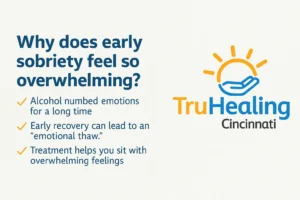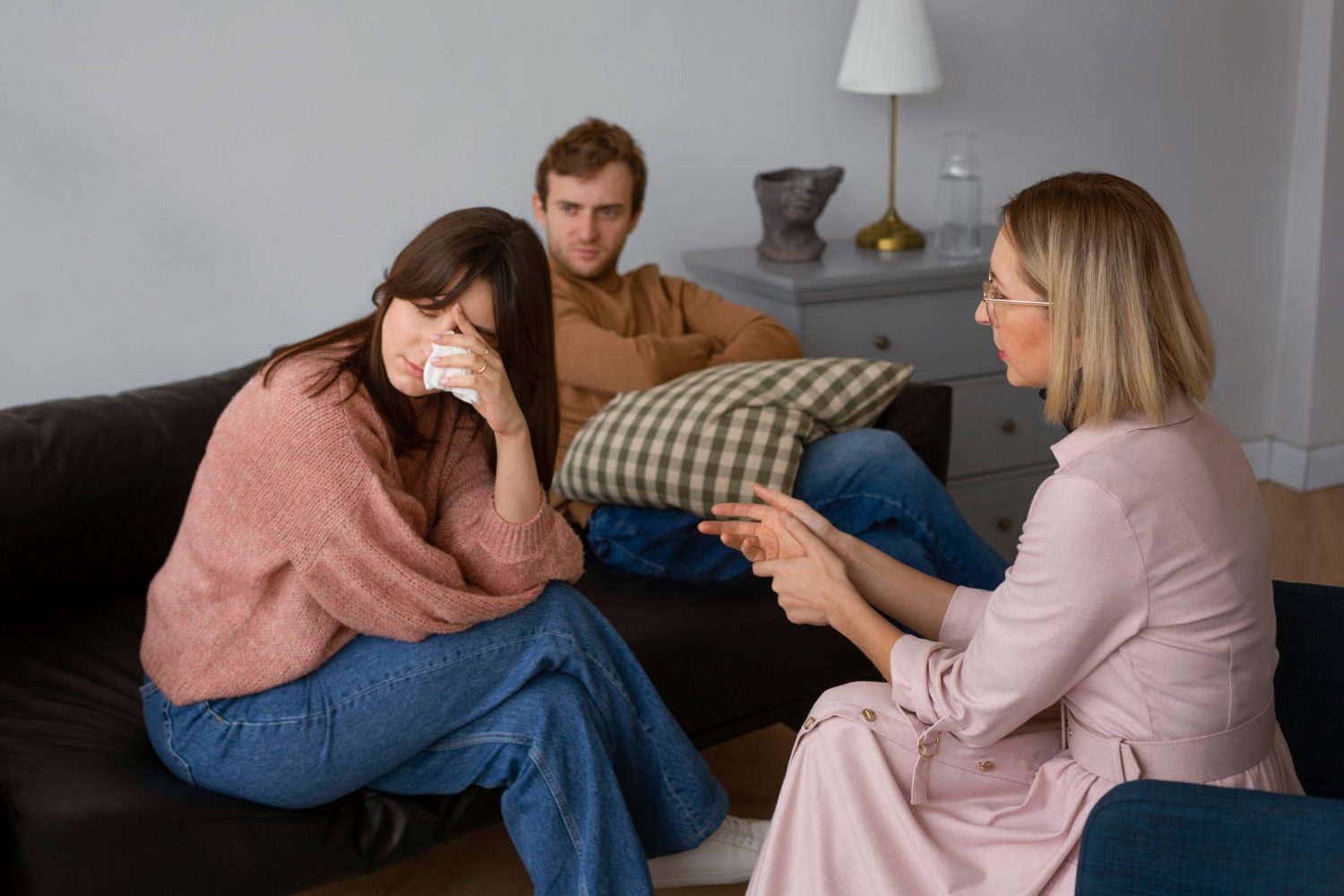Early sobriety can feel like someone turned all the lights on in a room you weren’t ready to walk into.
It’s loud. It’s emotional. Everything hurts—or nothing does, and that’s somehow worse. The silence feels heavy, the days feel long, and your own skin feels unfamiliar.
Most people talk about getting sober like it’s the finish line. But in reality? It’s just the start of feeling everything you spent years trying not to feel.
And that’s terrifying.
At TruHealing Cincinnati, we work with people in every stage of recovery. But there’s something uniquely sacred—and deeply fragile—about early sobriety. This blog is for the ones who feel raw, rattled, and not quite sure what to do with themselves now that alcohol is no longer an option.
Here’s how to navigate the emotional avalanche of early recovery—and what alcohol addiction treatment can do to help you feel human again.
Why do my emotions feel like too much all the time?
Because for a long time, alcohol did the work for you.
It numbed grief. Flattened anxiety. Postponed anger. Silenced joy. Blurred fear. Interrupted trauma.
It didn’t fix anything—it just kept the volume down.
Now that you’re not drinking, your nervous system is rebooting. Your brain chemistry is shifting. And your emotional range—previously muted—is coming back online.
That’s not a crisis. That’s healing.
It’s your body remembering what it’s like to feel again. And yes, it’s a lot at first. But that’s because you’re coming back to life.
Is this emotional flood part of alcohol addiction treatment?
Yes. And the best programs make space for it.
Early on, many people experience something called an “emotional thaw.” Think of it like ice melting in spring. It’s messy. It floods quickly. It can feel like too much too fast.
That’s why professional support matters. In alcohol addiction treatment, we don’t just focus on stopping drinking—we help you process what comes after.
At TruHealing, that means:
- Naming what you’re feeling
- Learning how to sit with discomfort instead of running from it
- Building coping tools for when emotions spike unexpectedly
If you’re looking for this kind of care near Lexington, Kentucky or Lawrenceburg, Kentucky, we provide services in those regions, too—because this support should never feel out of reach.
Why does loneliness hurt more now than it did before?
Because now, you’re actually feeling it.
Before sobriety, alcohol might’ve made loneliness quieter. A drink on the couch took the edge off. A night out made you feel less invisible. But none of it actually made you feel seen.
Now, in the absence of those numbing tools, the ache is louder. More honest. But also more capable of being addressed.
Loneliness in early recovery is often grief in disguise:
- Grief for relationships tied to drinking
- Grief for time lost
- Grief for an identity that no longer fits
You’re not just missing people. You’re missing who you thought you were with them.
And that’s a real loss.
But here’s what’s also real: connection is still available to you. It might feel awkward at first. But the loneliness won’t last forever. It shifts—especially when you talk about it with people who get it.
What if I’m scared these feelings will lead me to relapse?
That fear makes sense. And you’re not alone in it.
Many people relapse not because they want to drink—but because they feel overwhelmed, trapped, or desperate to not feel something.
Here’s what helps:
- Stay connected. Isolation is gasoline on the fire of overwhelm. Even one text or meeting can shift your whole day.
- Keep it simple. Sleep, food, water, light. These are not luxury items. They’re emotional stabilizers.
- Talk about it before it builds. Don’t wait until you’re at the edge. Tell someone when you’re halfway there.
The goal isn’t to never feel bad—it’s to build a life where feeling bad doesn’t mean the end of everything.
Is it normal to be angry, even if I don’t know why?
Absolutely.
Anger is part of healing. It shows up when your body starts to believe it’s safe enough to feel. And for people in recovery, that often brings up all kinds of long-dormant truths.
You might feel angry at:
- People who hurt you
- People you hurt
- Yourself
- The world
- The timeline it took to get here
None of that makes you wrong. Or unsafe. Or broken.
In treatment, we don’t push anger away—we get curious about it. Because underneath it is often grief. Or unmet needs. Or boundaries you’re just now realizing were crossed.
You’re allowed to be angry. And you’re allowed to heal it.

What if I cry all the time—or feel like I can’t stop?
Then you cry. And we hold the space for it.
In early recovery, crying often catches people off guard. It feels unproductive. Or weak. Or scary.
But crying is actually a sign that your nervous system is regulating. It’s your body releasing something old—without destroying you in the process.
It might come in waves. In therapy. In the car. In the shower. That’s okay.
Let it come.
Every tear is proof that the numbness is lifting. That you’re not stuck anymore.
Will these emotional ups and downs ever settle?
Yes. But not all at once.
It’s a slow softening. A gradual return to baseline. The swings won’t always be this big. The sadness won’t always feel so bottomless. The joy won’t always feel so suspicious.
As your brain chemistry balances and your coping skills grow, so will your capacity to feel without fear.
Treatment gives you tools. Community gives you context. Time gives you space.
Eventually, feeling won’t be terrifying—it’ll just be part of living.
Can I return to treatment even if I haven’t relapsed?
Yes. In fact, that’s one of the best times to go back.
Treatment isn’t just for relapse—it’s for re-stabilizing when things feel emotionally shaky. If you’re struggling to manage emotions, feeling isolated, or just want to reconnect with support, that’s more than enough reason to re-engage.
At TruHealing Cincinnati, we offer flexible outpatient care, alumni programming, and ongoing clinical support. And for those in neighboring cities, we also provide alcohol addiction treatment in Louisville, Kentucky and across the state.
You’re not “too stable” to need help. You’re allowed to want more than just staying sober. You’re allowed to want to feel better.
What do I do when I just feel like giving up?
Tell someone. That’s the most important thing.
If the weight of your emotions ever turns into hopelessness—or thoughts that scare you—say it out loud. To your sponsor. To a friend. To a therapist. To us.
You don’t have to manage that kind of pain alone. And you’re not weak for having it.
So many people in recovery have moments where they think, “I don’t want to die, but I don’t know how to live like this.”
That’s not the end. It’s a cue. A sign that you’ve hit a depth that needs support, not shame.
Let us meet you there.
Final Thought: You’re Not Broken—You’re Rebuilding
Early recovery is a paradox.
You’ve removed the thing that was hurting you… but somehow, everything still hurts.
That doesn’t mean you’re failing. It means you’re healing.
You are rebuilding a relationship with your own emotions—slowly, imperfectly, honestly. And even on the worst days, that work is worth it.
Ready to keep going, even when it’s hard?
Call (888) 643-9118 or visit to learn more about our alcohol addiction treatment services in Cincinnati, Ohio.
We’ll help you feel it—without falling apart.


